|
|
 |
Fiche d'espèce de Copépode |
|
|
Calanoida ( Ordre ) |
|
|
|
Diaptomoidea ( Superfamille ) |
|
|
|
Acartiidae ( Famille ) |
|
|
|
Acartia ( Genre ) |
|
|
|
Acartiura ( Sous-Genre ) |
|
|
| |
Acartia (Acartiura) margalefi Alcaraz, 1976 (F,M) | |
| | | | | | | Syn.: | ? Acartia lefevrae Bradford,1976 (p.168, figs.F); ? Holmes, 2001 (p.35);
? Acartia clausi: Comaschi Scaramuzza, 1978 (part., p.16: Rem.) | | | | Ref.: | | | Alcaraz, 1976 (p.61, figs.F,M); 1983 (p.891); Coen & Mazzocchi, 1985 (p.789, figs.F,M); Ryan & al., 1986 (p.739); Zagami & Guglielmo, 1988-89 (p.61, figs.F,M); Cervelli & al., 1995 (p.117, Rem.: biol. mol.); Belmonte & Mazzocchi, 1997 (p.252, figs.F,M); Belmonte & Cavallo, 1997 (p.377); Belmonte, 1998 a (p.38, fig., Rem.: eggs); Bradford-Grieve, 1999 (n°181, p.4, figs.F,M); Castro-Longoria, 2001 (p.225, fig.1); Avancini & al., 2006 (p.111, Pl. 79, figs.F,M, Rem.); Vives & Shmeleva, 2007 (p.424, figs.F,M, Rem.); Gubanova & al., 2013 (in press, Rem: p.2, Table 1, 4, fig.2). | 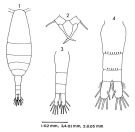 issued from : M. Alcaraz in Inv. Pesq. 40 (1). [Fig.3, p.63]. Female (from Ria de Vigo, NW Spain): 1, habitus (dorsal view); 2, P5; 3, urosome (dorsal view). 4, urosome (dorsal view from Acartia clausi. Specimens located in the Ria of Vigo (NW Spain). Rem: P5 = fifth leg
|
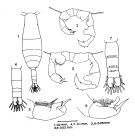 issued from : M. Alcaraz in Inv. Pesq. 40 (1). [Fig.2, p.62]. Male: 1, habitus (dorsal view); 2, P5; 3, left terminal segment of P5; 4, urosome (dorsal view) Acartia clausi Male: 5, P5; 6, left terminal segment of P5; 7, urosome (dorsal view). Specimens located in the Ria of Vigo (NW Spain). Rem: P5 = fifth leg
|
 issued from : M. Alcaraz in Inv. Pesq. 40 (1). [Table 1, p.71]. Comparison between Acartia margalefi and Acartia clausi. Specimens located in the Ria of Vigo (NW Spain).
|
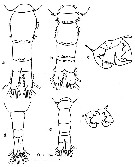 issued from : G. Zagami & L. Guglielmo in Mem. Biol Mar. Oceanogr.,1988-89, 17. [p.62, Fig.1]. Comparison between and Acartia margalefi from Sicilia (Italia).
Acartia clausi: a, urosome female (dorsal view); b, urosome male (dorsal view); c, P5 male.
Acartia margalefi: d, urosome female (dorsal view); ; e, urosome male (dorsal view); f, P5 male.
|
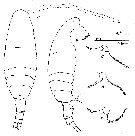 issued from : J.M. Bradford in N. Z. Jl Mar. Freshw. Res., 1976, 10 (1). [p.168, Fig.5]. As . With doubt.
Female (from W France: Brest Harbour; Italy: Genoa Harbour): a-b, habitus (dorsal and lateral, respectively); c-e, P5.
|
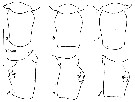 issued from : J.M. Bradford in N. Z. Jl Mar. Freshw. Res., 1976, 10 (1). [p.169, Fig.6]. As . With doubt.
Female: genital segment. a-c, dorsal view; d-f, lateral view.
|
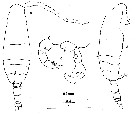 issued from : J.M. Bradford in N. Z. Jl Mar. Freshw. Res., 1976, 10 (1). [p.170, Fig.7]. As . With doubt.
Male (from W France: Brest Harbour; Italy: Genoa Harbour): a-b, habitus (dorsal and lateral, respectively); c, P5 (posterior surface).
|
 issued from : E.V. Pavlova & A.A. Shmeleva in Vestnik zoologii, 2010, 44 (2). [p. e-5, Table 2]. Female: Dimensions and morphological characteristics. Nota ** : cites from Table 1 the dimensions for A. margalefi (Sevastopol) adopted from Belmonte & Mazzocchi, 1997.
|
 Issued from : M.G. Mazzocchi in Guida al Riconoscimento del plancton dei Mari Italiani, Vol. II, 2006. [p.87, Tav. 79]. After A. Comaschi. Female: a-b, habitus (dorsal and lateral, respectively); c, urosome (dorsal); e, P5. male: f, habitus (dorso-lateral); g, urosome (dorsal); h, P5 (posterior view); ; i, exopodal segment 2+3 of left P5.
| | | | | Ref. compl.: | | | Comaschi Scaramuzza, 1987 (tab.1); Ceccherelli & al., 1987 (p.571 fig.5); Belmonte & al., 1989 (p.519); Jouffre & al., 1991 (p.489, lagoon); Alcaraz & Saiz, 1991 (p.137, fig.3, Table II, turbulence effects); Saiz & Alcaraz, 1992 (tab.1); Mauchline, 1998 (tab.8, 78, p.508: Rem.); Siokou-Frangou, 1999 (p.478); Belmonte & Potenza, 2001 (p.174); Comaschi & al., 2001 (p.523, pluriannual abundance); Bressan & Moro, 2002 (tab.2); Zagorodnyaya & al., 2003 (p.52); Vaglio al., 2005 (p.163); Smeleva & Selifonova, 2005 (p.57); Camatti & al., 2006 (p.46, fig.5); Valdés & al., 2007 (p.104: tab.1); Sei & Ferrari, 2006 a (p.1, Rem.); Rossi, 2008 (p.90: Tableau XII); Aravena & al., 2009 (p.621, seasonal & spatial distribution vs. environmental factors); Mazzocchi & Di Capua, 2010 (p.423); Mazzocchi & al., 2011 (p.1163, fig.6, long-term time-series 1984-2006); Vidjak & al., 2012 (p.243, Rem.: p.253); Mazzocchi & al., 2012 (p.135, annual abundance 1984-2006); Belmonte & al., 2013 (p.222, Table 2, abundance vs stations); Lidvanov & al., 2013 (p.290, Table 2, % composition) ; Pansera & al., 2014 (p.221, Table 2, abundance); Zaafa & al., 2014 (p.67, Table I, occurrence): Uriarte & al., 2016 (p.718, fig.5: abundance vs years 1998-2011); El Arraj & al., 2017 (p.272, table 2, spatial distribution); Belmonte, 2018 (p.273, Table I: Italian zones); Camatti & al., 2019 (p.1, fig. 3, 5, 6, 7, 8, 9, 10, Table 1, 4, 5, Rem.) | | | | NZ: | 3 | | |
|
Carte de distribution de Acartia (Acartiura) margalefi par zones géographiques
|
| | | | | | | | |  Issued from : M.G. Mazzocchi, L. Dubroca, C. Garcia-Comas, I. Di Capua & M. Ribera d'Alcalà in Progr. Oceanogr., 2012, 97-100. [p.143, Fig.10]. Issued from : M.G. Mazzocchi, L. Dubroca, C. Garcia-Comas, I. Di Capua & M. Ribera d'Alcalà in Progr. Oceanogr., 2012, 97-100. [p.143, Fig.10].
Long-term variability of the abundance (Ind. m3) of rare copepod species that disappeared in the second period of the time-series at Station MC (Gulf of Naples), by vertical tows in the upper 50 m.
Mazzocchi & al. (2012, p.148) point to this species is typically found in harbors and other semi-enclosed systems such as coastal ponds. It was a dominant copepod in the Venice Lagoon until the late 1980s when in the 1990s it was replaced by Acartia tonsa introduced in the mediterranean in the early 1980s. During the same period, A. margalefi has also almost disappeared from the Po River Delta and has drastically reduced its confinement to littoral lakes along the Tyrrhenian coasts. |
 issued from : M. Alcaraz in Inv. Pesq. 40 (1). [p.64, Fig.4]. issued from : M. Alcaraz in Inv. Pesq. 40 (1). [p.64, Fig.4].
Comparison between Acartia margalefi and Acartia clausi.
Specimens located in the Ria of Vigo (NW Spain): Variation of the metasome length along the years. Continuous line: females; dotted line: males. |
| | | | Loc: | | | Norway (Svartatjönn), North Sea, W Ireland (Killary Harbour), ? River of Morlaix, Southampton, ? Brest Harbour, Arcachon, Bilbao estuary, Ria de Arosa, Ria de Vigo, Morocco-Mauritania, W Tangier, Medit. (Barcelona & Masnou harbours, Bages-Sigean lagoons, Thau lagoon, Toulon Harbour, Genoa harbour, G. of Naples, Sicilia, Messina Strait, Lake Faro, Taranto, S Adriatic Sea, Venise, Po delta, Island of Pag, G. de Saronikos, Aegean Sea, Black Sea).
Type locality: Ria de Vigo (NW Spain) | | | | N: | 35 | | | | Lg.: | | | (185) F: ± 0,792; M: ± 0,778; (251) F: 0,864-0,8; M: 0,821-0,774 [Norvège]; F: 0,85-0,764; M: 0,839-0,702 [Sebastopol]; {F: 0,764-0,85; M: 0,702-0,839} | | | | Rem.: | Confondu parfois avec Acartia clausi dans les eaux saumâtres, mais de dimensions beaucoup plus petites, comme A; teclae.
Cette espèce est dédiée à Ramon Margalef, Professeur d'Ecologie à l'Université de Barcelone.
En tant qu'enseignant au Laboratoire Arago (Banyuls), qu'il connaissait bien, j'évoquais aux étudiants ses ouvrages comme des modèles de créativité. Esprit fertile, bouillonnant d'idées, jouant avec les concepts physico-écologiques, on pouvait le caractériser comme le "Dali" de l'océanologie, autre grande personnalité catalane. Sous des dehors sérieux, voire austères, il ne manquait pas de sens de l'humour, me définissant ce qu'était un copépode: une patte 5 attachée à quelque chose. (cf. Hommage to Ramon Margalef inOecologia aquatica, 10, Publ. Universitat de Barcelona, 1992).
Vives & Shmeleva (2007, p.425) considèrent que Acartia lefevrae n'est pas un synonyme de cette espèce. D'où certaines localisations discutables dans les eaux saumâtres des estuaires et portuaires.
Voir aussi les remarques en anglais | | | Dernière mise à jour : 25/10/2022 | |
|
|
 Toute utilisation de ce site pour une publication sera mentionnée avec la référence suivante : Toute utilisation de ce site pour une publication sera mentionnée avec la référence suivante :
Razouls C., Desreumaux N., Kouwenberg J. et de Bovée F., 2005-2026. - Biodiversité des Copépodes planctoniques marins (morphologie, répartition géographique et données biologiques). Sorbonne Université, CNRS. Disponible sur http://copepodes.obs-banyuls.fr [Accédé le 08 janvier 2026] © copyright 2005-2026 Sorbonne Université, CNRS
|
|
 |
 |













